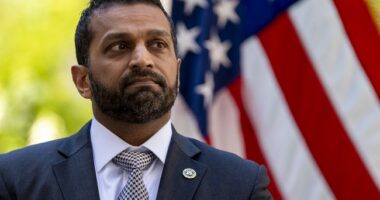Anthony Albanese’s Labor government is so radical it wants to introduce a tax no other country in the world has. And chances are you haven’t even heard about it.
Australia’s most left-wing government – since Gough Whitlam ran up public debt in the 1970s – is quietly seeking to introduce a tax on ‘unrealised gains’.
In layman’s terms, Australians would be paying tax on the increased value of an asset they still own and have yet to sell – namely superannuation savings above a certain threshold.
That’s an unprecedented departure from the usual approach where someone pays capital gains tax on an investment property or shares only once they have sold those assets – and not before.
The proposed tax has flown under the radar, having been overshadowed by Labor’s plans to raise taxes for Aussies with more than $3million in their super. The press gave it scant mention early last year and it has gone virtually unreported ever since.
A Google search for ‘unrealised gains’ yields a single news result from a mainstream media outlet and a handful of blog posts – remarkable given the ramifications for people planning their retirement.
And the proposed tax isn’t just secretive – it’s confusing, too.
Professor Robert Breunig, the director of the Australian National University’s Tax and Transfer Policy Institute, says Labor’s policy is very confusing – and he has been a tax expert for 26 years.

Anthony Albanese ‘s Labor government is so radical it wants to introduce a tax no other country in the world has. And chances are you haven’t even heard about it
‘I don’t think they’ve fully thought through the implications of how difficult this is going to be,’ he tells me.
‘Frankly, we are in a world where the government keeps introducing policies that they haven’t thought very hard about how they’re going to implement them.
‘They just leave the mess for the people on the ground to sort out.’
There are fears Labor’s system could be so complicated even the Australian Taxation Office would struggle to administer the new laws.

Professor Robert Breunig, the director of the Australian National University’s Tax and Transfer Policy Institute, says Labor’s policy is very confusing – and he has been a tax expert for 26 years
‘Making things overly complex makes things expensive, makes the system hard to run, makes it hard for the ATO to do compliance checks,’ notes Prof Breunig, widely considered Australia’s most respected expert on public finance.
‘You want to avoid those things.’
Prof Breunig has contradicted Treasurer Jim Chalmers – who last year argued a tax on unrealised gains would apparently be simple.
‘That’s the advice of Treasury, working with other relevant agencies, that that is the most efficient, simplest and best way to go about it, and so that’s what we intend to do,’ Dr Chalmers told reporters in Brisbane.
Dr Chalmers, who has a PhD on former Labor prime minister Paul Keating, in June acknowledged crossbench senators had concerns around the policy.
‘We’re in discussions obviously across the parliament to try and legislate it,’ he said.
‘And this is one of the issues that has come up – the issue around unrealised gains.’
He didn’t acknowledge how Keating, as treasurer before becoming PM, only applied the capital gains tax to assets once they were sold, when Labor introduced that policy in 1985.
While the Greens want the threshold for unrealised gains reduced to $2million, Teal MPs are concerned the Better Targeted Superannuation Concessions bill is too complicated and will backfire.
The federal government early last year announced a plan to double the tax to 30 per cent for Australians with superannuation balances of more than $3million.
But hidden in the detail was a plan to tax unrealised gains on self-managed super funds.
This clause, known as Division 296, will make Australia the only country that taxes unrealised gains on retirement savings.
‘It’s pretty unusual around the world to tax unrealised gains,’ Prof Breunig says.
From July 2025, should Labor’s legislation pass through parliament, anyone with more than $3million in retirement savings would be taxed on the super savings above that threshold.
That means someone with close to $3million in superannuation savings would have to divest part of their retirement savings to fall under this threshold.

In layman’s terms, Australians would be paying tax on the increased value of an asset they own and have yet to sell, namely superannuation savings above a certain threshold (stock image)
This would create a new level of complexity if assets were hard to sell and an individual suddenly had retirement savings of more than $3million.
‘It could potentially be very complicated if people have very illiquid assets,’ Prof Breunig tells me.
‘So, if you had large blocks of property – it’s hard to sell one two-hundredth of your property to pay your tax bill.
‘It’s going to be pretty confusing – people have small businesses inside of their self-managed super funds.’
Giving an example of how complex the proposed tax could be in practice, Prof Breunig says someone with a self-managed super fund who owned a farm would have difficulty calculating just how much the asset was worth in a financial year if there weren’t other similar farms in the area that had recently sold to compare it to.
‘It’s a pretty crude approximation, often,’ he adds.
‘Valuing those things is going to be difficult and then for people who do not have liquid assets, paying them is going to be difficult.’
Sweden and Germany during the 1970s and 1980s taxed unrealised gains on wealth, but the policy was notoriously difficult to administer.
And France still has a wealth tax that applies on assets worth more than €1.3million (AU$2.1million).
But even the European nations, renowned for having higher income taxes to fund more services, do not touch retirement savings in this way.

One of Australia’s most respected experts on tax has contradicted Treasurer Jim Chalmers (pictured), who last year argued a tax on unrealised gains would apparently be simple
U.S. Democrat presidential candidate Kamala Harris is campaigning to tax unrealised gains on wealth – but only for the ultra rich with assets worth US$100million (AU$151million) or more.
But again, the vice president hasn’t gone after retirement savings in her campaign against Republican Donald Trump.
Shadow treasurer Angus Taylor likened the tax on unrealised gains on super to something you’d find in a dictatorship.
‘It’s why governments around the world have always been very reluctant to go after unrealised capital gains, unless there’s some kind of crazy, left-wing Communist dictatorship,’ he said.
‘So this is really, seriously, crossing the line. It’s absolutely crossing the line.’
Taxing unrealised gains is a policy so radical for Australia that even the Whitlam government’s treasurer Jim Cairns, a self-described socialist and former academic, didn’t even go there, preferring to fight unsuccessfully for higher income taxes and price controls.
At least this former Labor deputy prime minister, who had once applied to join the Communist Party, acknowledged the electorate was generally distrustful of his side of politics.
‘History is not on the side of the left,’ he said.
If only the Albanese government had the same political self-awareness.







